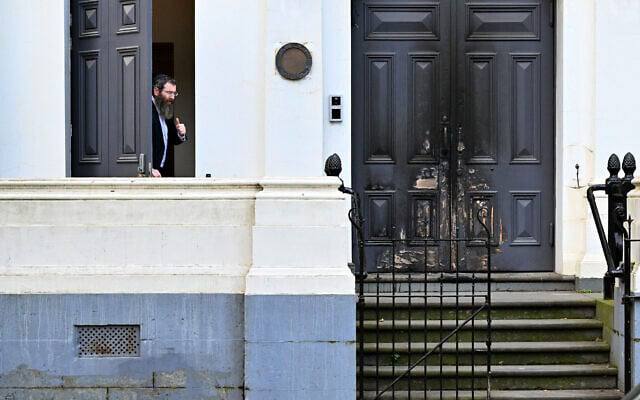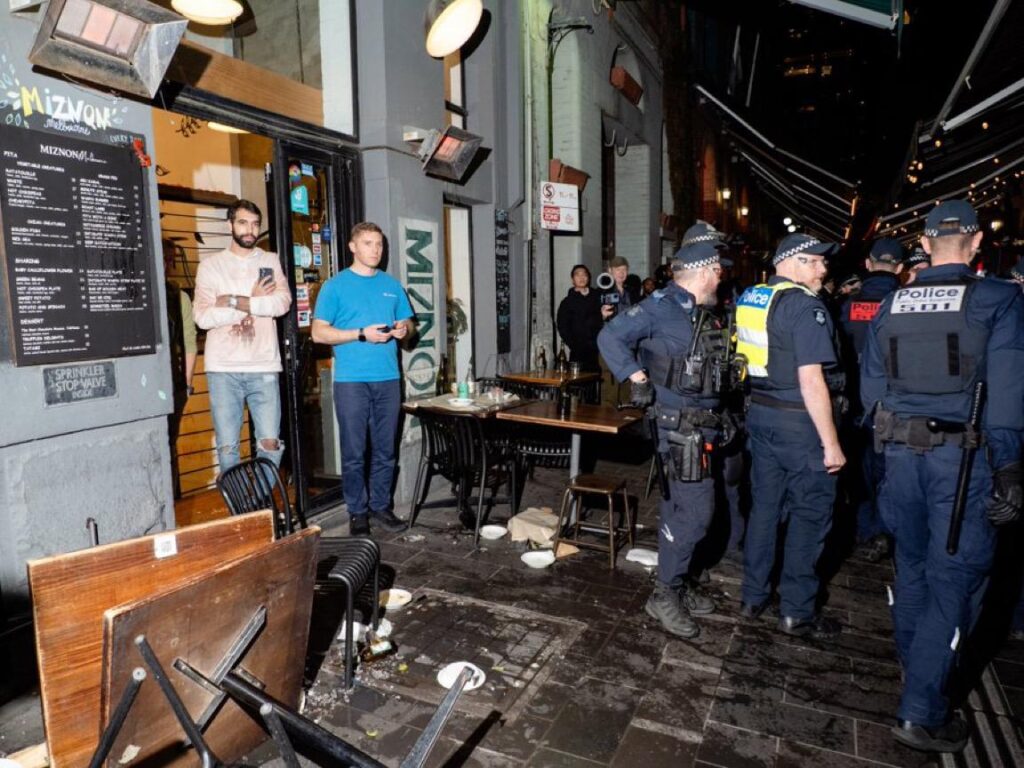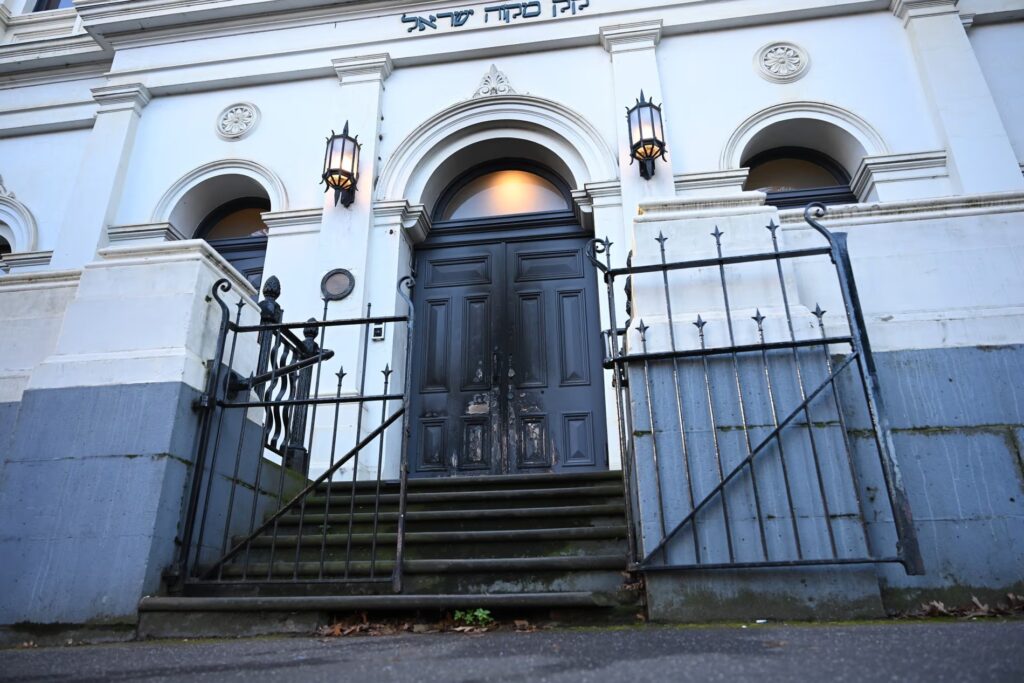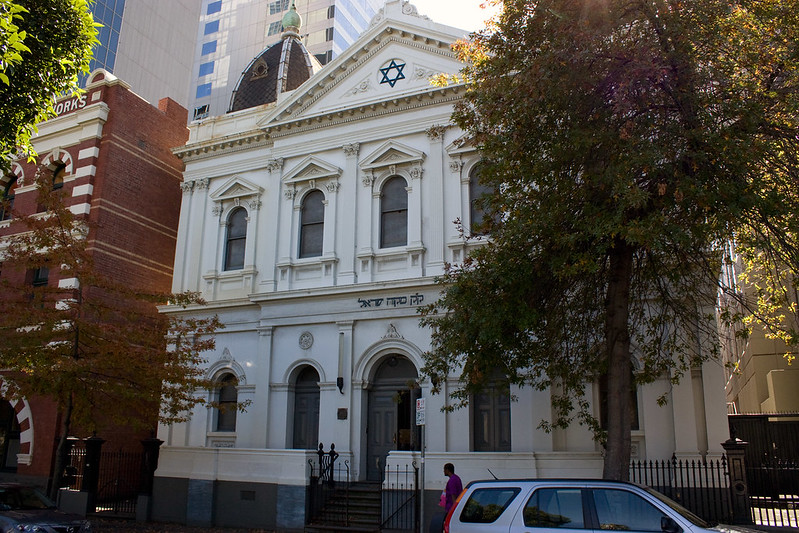UPDATES
UNIFIL and the Hezbollah tunnels
December 18, 2018 | AIJAC staff
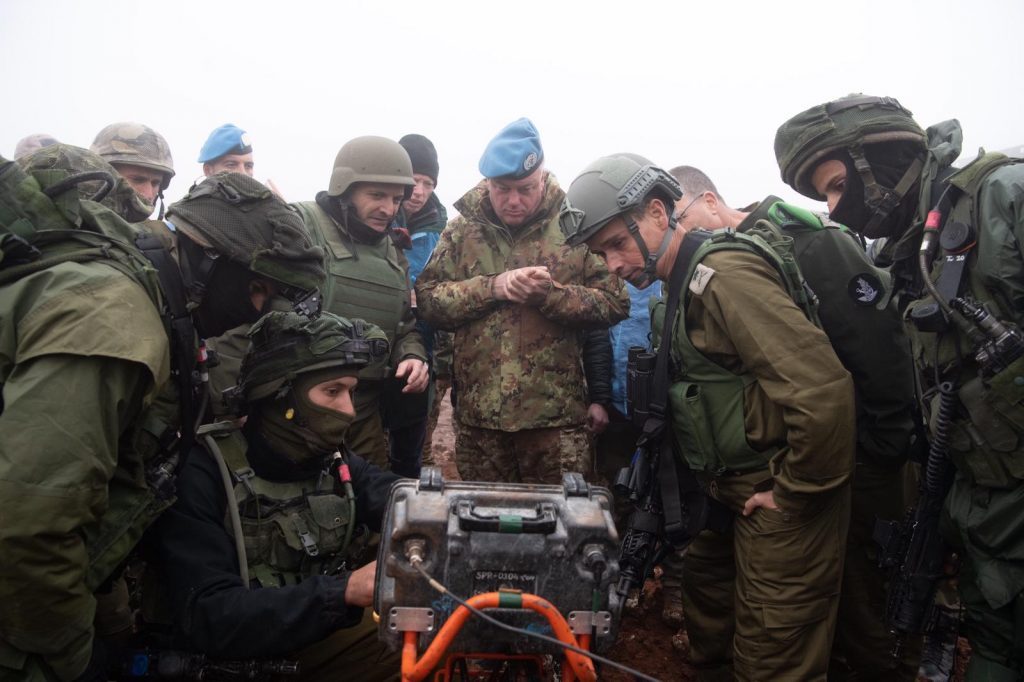
Update from AIJAC
Update 12/18 #02
This Update is devoted to the issue of the questions raised about UNIFIL, the UN peacekeeping force in southern Lebanon, by Israel’s discovery of a series of underground cross-border tunnels dug by Hezbollah into Israeli territory from Lebanon.
We lead with former senior US official Elliott Abrams’ look at UNIFIL’s performance. He argues that the aftermath of the tunnel discovery suggests that, not only did UNIFIL fail badly in its primary purpose under the relevant UN Security Council resolutions of preventing southern Lebanon being used for “hostile activities”, but seems determined to continue to fail. He notes particularly that the UNIFIL response to the tunnel revelation was simply to promise to “communicate its preliminary findings to the appropriate authorities in Lebanon” – which, given that the Lebanese government is dominated by Hezbollah, means in practice doing nothing. For Abrams’ discussion in more detail, CLICK HERE.
Next up is veteran Israeli columnist Evelyn Gordon, who argues that not only is UNIFIL not being helpful with respect to the Lebanon situation, but may have become positively harmful. She says it was never realistic to expect UNIFIL to disarm Hezbollah or fully police the area under its control – but say it is inexcusable that UNIFIL refuses to even accurately report what is happening in southern Lebanon for fear of offending Hezbollah. More than this, she argues that the presence of European troops in UNIFIL, effectively hostage to Hezbollah’s goodwill, appears to be stopping some European governments from taking effective action to ban Hezbollah as a terrorist group. For this important piece in full, CLICK HERE. More comment on UNIFIL and the tunnels comes from another Israeli columnist, Ruthie Blum.
Finally, a third well-known Israeli columnist, Ben-Dror Yemini, makes an interesting comparison between Hezbollah in Lebanon and the dilemmas Israel faces with respect to Hamas in Gaza. In particular, he uses Hezbollah to debunk the claim that Hamas could be appeased if only Israel lifted its blockade of Gaza, and facilitated economic development there. He notes that the US attempted this with Lebanon, but it did not change Hezbollah’s behaviour – such as building terror tunnels at great expense – because it is a jihadist organisation devoted to hatred and violence, and Yemini argues Hamas is in the same mould. For his insightful argument, CLICK HERE.
Readers may also be interested in…
-
-
- Israel has now reportedly found a fourth Hezbollah tunnel.
- Meanwhile, UNIFIL has now acknowledged that the tunnels violate UN Security Council resolution 1701 – which given UNIFIL’s history of turning a blind eye to Hezbollah activity is actually a step forward rather than simply a statement of the obvious.
- A good CNN video report featuring a look inside one of the tunnels.
- With ongoing increased terrorist violence in the West Bank over the past week or so, numerous commentators are writing about this as likely being a Hamas-orchestrated campaign. Analysis of this apparent campaign comes from Khaled abu Toameh, Pinhas Inbari, and Ron Ben Yishai.
- What’s more, Hamas has effectively admitted they are behind the attacks with Hamas leader Ismail Haniyeh saying, “I will also respond to the Zionists who are saying what is happening in the West Bank is based on directives and arrangements from Gaza. This is an accusation that we do not deny… because it is a source of pride reigning over all of us.”
- Some examples from the many stories and comments now appearing at AIJAC’s daily “Fresh AIR” blog:
- With Australian PM Scott Morrison speech (full speech text here) at the Sydney Institute on Saturday announcing the results of the government’s reviews of its policies on recognising Jerusalem as Israel’s capital, and countering Iranian misbehaviour, here is AIJAC’s media release in response.
- In the lead-up to the announcement, AIJAC’s Tzvi Fleischer spoke to Sky-News about the case for Australian recognition of Jerusalem as Israel’s capital.
- Oved Lobel explains how the arrest of Iranian-Australian academic Dr Meimanat Hosseini-Chavoshi in Iran is part of larger crackdown by Teheran on Iranian dissidents both at home and abroad.
-
UNIFIL and the Hezbollah tunnels
Elliott Abrams
Council on Foreign Relations “Pressure Points” blog, Dec. 7, 2018
Israel announced last week the discovery of several tunnels dug by Hezbollah and reaching from Lebanon into Israel. Their existence has been confirmed and has been condemned not only by Israel but as well by the United States, Germany, and the United Kingdom.
The head of UNIFIL, the U.N. force along the Israel-Lebanon border, was taken to see one of the tunnels. Reuters reported as follows:
“U.N. peacekeepers in Lebanon have confirmed the existence of a tunnel discovered by the Israeli military close to the Blue Line separating the two countries, it said in a statement on Thursday.
“The U.N. Interim Force in Lebanon (UNIFIL) is ‘engaged with the parties to pursue urgent follow-up action’ and ‘will communicate its preliminary findings to the appropriate authorities in Lebanon,’ it added.”
UNIFIL Commander Maj. Gen. Stefano Del Col confirmed the existence of tunnels during an inspection with IDF GOC Northern Command Maj. Gen. Yoel Strick, describing this as a “serious occurrence.”
These tunnels are quite obviously a violation of Israeli sovereignty, and a violation of the governing UN Security Council resolutions, 1559 and 1701. Those resolutions demand that the Lebanese government exercise sovereignty in all of Lebanon. Resolution 1701 “calls upon the government of Lebanon and UNIFIL … to deploy their forces together throughout the south” of Lebanon.
Resolution 2373, adopted in August 2017, extended the UNIFIL mandate. It added that the Security Council “recalls its authorization to UNIFIL to take all necessary action in areas of deployment of its forces and as it deems within its capabilities, to ensure that its area of operations is not utilized for hostile activities of any kind.”
The existence of these tunnels, dug from precisely the area of southern Lebanon that UNIFIL is meant to patrol, means that this area is indeed “utilized for hostile activities.” What then is the meaning of the UNIFIL response stating that “will communicate its preliminary findings to the appropriate authorities in Lebanon”? The meaning is that UNIFIL will likely do nothing.
UNIFIL is not supposed to be merely a means of communication, or the Security Council would have bought cellphones instead of paying for a military force. Moreover, there are no “appropriate authorities” in Lebanon or Hezbollah would never have been able to dig its tunnels.
The tunnels are hardly the only brazen Hezbollah violation of the Security Council resolutions undertaken right under UNIFIL’s nose. Consider this: Hezbollah is blocking roads in southern Lebanon to smooth the path of missiles it is moving into the area, according to a report quoted in Israel Hayom. Then there is the village of Kafr Kila, just north of the Israeli border, where there is a Hezbollah headquarters and according to the Israelis about 20 warehouses with weapons, combat positions, lookout positions, dozens of underground positions. All this was built in an area supposedly patrolled by UNIFIL.
What is to be done? As I wrote in a previous post about UNIFIL and its new commander, “Del Col should test the limits. That will make Hezbollah angry, but if Hezbollah isn’t vexed by UNIFIL’s presence then we are all wasting a lot of money – $500 million a year is the UNIFIL budget – and effort supporting that organization and making believe that it is enforcing Resolution 1701.”
This is a test of UNIFIL and its new commander. “Communicating” to “appropriate authorities” is a euphemism for doing nothing at all. Hezbollah is preparing for war. UNIFIL is supposed to get in its way. If it cannot hinder Hezbollah’s war preparations in any way and is even ignorant of them, UNIFIL is a waste of time and money.
Elliott Abrams is a senior fellow for Middle East Studies at the Council on Foreign Relations.
UNIFIL Deters EU from Banning Hezbollah
An obstacle on the road to peace
EVELYN GORDON
Commentary “Contentions”, DECEMBER 13, 2018
 UNFIL soldiers: Constraining Europe rather than Hezbollah?
UNFIL soldiers: Constraining Europe rather than Hezbollah?
It’s no secret that UNIFIL, the UN peacekeeping force in Lebanon, has never done the job it’s supposedly there to do. But this week, we learned that UNIFIL isn’t merely useless; it’s counterproductive. By the very fact of its existence, the organization deters the European Union from listing Hezbollah as a terrorist organization—something which, unlike UNIFIL, would genuinely impede Hezbollah’s operations.
This dirty little secret came out after Italian Interior Minister Matteo Salvini called Hezbollah “Islamic terrorists” during a visit to Israel on Tuesday. The Italian Defense Ministry promptly issued a press statement blasting Salvini for “embarrassing” Rome by calling a spade a spade. “These statements obviously put in a very difficult position our men who are deployed on that southern border,” the statement warned, referring to the Italian contingent of UNIFIL deployed along Lebanon’s border with Israel.
It doesn’t take an Einstein to realize that if Italy’s Defense Ministry fears repercussions to its troops from a single minister daring to call Hezbollah “terrorists,” it would be terrified of the consequences should the EU ever formally declare Hezbollah a terrorist organization. Thus, Italy’s significant involvement in UNIFIL—it currently contributes over 10 percent of UNIFIL’s manpower, including its commanding officer—constitutes a major deterrent to consenting to such a step.
Nor is Italy unique in this regard. Several EU countries make significant troop contributions to UNIFIL, including France, Germany, Spain, Ireland, Austria, and Greece. Europe also usually supplies the force’s commander. The previous commander was Irish, the two before him were Italian, the one before that was Spanish, etc.
It’s no coincidence that the major contributors to UNIFIL also oppose listing Hezbollah in its entirety as a terrorist organization. The only EU country that does blacklist the entire organization is Holland, which has exactly one soldier in UNIFIL.
The EU and its other member states blacklist only the military wing, not the political wing. And that’s fine by Hezbollah because, as the organization itself admits, any distinction between its political and military wings is purely fictitious. Thus as long as the political wing is legal, Hezbollah can still fundraise and recruit freely in Europe.
A complete ban, however, would genuinely hurt Hezbollah. According to a 2017 German intelligence report, Germany alone has some 950 Hezbollah operatives actively fundraising and recruiting for the organization. Much of that money is raised through charitable donations, but another significant source is organized crime. An EU report published in August described “a large network of Lebanese nationals offering money laundering services to organized crime groups in the EU and using a share of the profits to finance terrorism-related activities of the Lebanese Hezbollah’s military wing.”
Indeed, Hezbollah leader Hassan Nasrallah has said openly that being blacklisted in Europe “would dry up the sources of finance” and “end moral, political, and material support,” while also pressuring other countries—“especially the Lebanese state”—to do the same. An EU ban on Hezbollah would put a serious crimp in its operations.
UNIFIL, by contrast, hasn’t put the slightest crimp in them. In 2006, the force was significantly expanded to better carry out the provisions of Security Council Resolution 1701, which included “the disarmament of all armed groups in Lebanon” and ridding southern Lebanon of “any armed personnel, assets, and weapons” not belonging to the Lebanese Army or UNIFIL. We all know how that worked out.
Today, Hezbollah’s arsenal is ten times larger than it was then, with around 150,000 missiles stockpiled in civilian areas, troops deployed throughout southern Lebanon, and dug cross-border tunnels clearly intended for offensive purposes. As Salvini said in reply to his Defense Ministry’s statement, “I don’t think [Hezbollah] dug tunnels dozens of meters underground to go shopping.”
To be fair, expecting UNIFIL to stop Hezbollah was never realistic. As a senior Israeli official acknowledged this week, few countries would be willing to contribute troops to a mission that actually involved fighting Hezbollah.
What’s inexcusable, however, is that UNIFIL has never even reported any of Hezbollah’s activities to mobilize international action against the organization. On the contrary, whenever Israel complains, UNIFIL insists it has seen no sign of hostile activity.
This might even be true because UNIFIL has learned not to look anywhere Hezbollah doesn’t want it to look. Back in 2010, after a French unit made the mistake of actually trying to do its job by conducting searches and using sniffer dogs, Lebanese “civilians” clashed with UNIFIL troops, seized their weapons and threw stones at them until UNIFIL’s commander forbade such searches. Today, the UN confines itself to meaningless statements about how “allegations of illegal arms transfers … warrant serious concern” and would violate Resolution 1701, but they are “not in a position to substantiate them independently.”
And even when turning a blind eye becomes impossible—like when Israel took UNIFIL officers on a guided tour of the cross-border tunnels—the organization is careful never to blame Hezbollah. As the blogger Elder of Ziyon reported last week, UNIFIL’s press statement about the tunnels didn’t accuse anyone of responsibility; it never mentioned Hezbollah at all. In fact, the post continued, “the UNIFIL website has not mentioned the word ‘Hezbollah’ or ‘Hizbollah’ since the 2006 war!
In contrast, UNIFIL has no problem making accusations against Israel. The same November report that couldn’t “substantiate” Hezbollah’s arms transfers declared that UNIFIL had recorded 550 Israeli violations of Lebanon’s airspace and demanded their “immediate cessation.
So the international community is spending $500 million a year on a “peacekeeping” force that hasn’t stopped Hezbollah’s military buildup, hasn’t even reported it in an effort to mobilize international action and serves as a deterrent to a measure that really would hurt Hezbollah: being blacklisted by the EU. Its only useful function is serving as a communications channel between the Israeli and Lebanese governments, and one man with a cellphone could accomplish that. To call this a waste of money is a colossal understatement. And it’s not likely to change, given that efforts to reform UNIFIL have repeatedly failed.
The better solution would be to dissolve UNIFIL, put those $500 million to some better use, and focus instead on getting the EU to blacklist Hezbollah. Admittedly, that might not happen even if UNIFIL disappears. But it definitely won’t happen as long as UNIFIL exists.
Evelyn Gordon, who writes for Commentary’s blog, is a journalist and commentator living in Israel.
Jihad forces cannot be tamed or appeased
Ben – Dror Yemini
Ynet.com, Dec. 12, 2018
Op-ed: It is bewildering how many believe Hamas can be appeased despite Hezbollah proving that Jihad forces need no excuse for their propagation of destruction; Hezbollah is also world’s largest crime organization but Obama chose a conciliatory policy ignoring their drug smuggling, money laundering.
If Israel only eliminated the blockade of the Gaza Strip, there will be neither rockets nor tunnels. The Strip will flourish. There will be no confrontations. This argument, which is prevalent in certain circles, in the world and in Israel, should be examined against the backdrop of Operation Northern Shield.
Well, Israel is not imposing any blockade on Lebanon, which is controlled by Hezbollah. There is no historical conflict with the Lebanese people. Lebanon has even been the focal point of tourism in the Arab world for many years; great beaches, restaurants, and a dazzling nightlife — a paradise.
But Lebanon has an Iranian element: Hezbollah. And they are building a network of missiles and tunnels, just like in the south, in the context of their profound hatred for the West, including Israel and the Jews.
Turning to Hamas for a moment, we must ask: Will the Gaza Strip begin to flourish once the blockade is lifted? Will Hamas change its skin?
Hezbollah provides us with the answer. It is not about the blockade or a particular conflict, nor is it a border dispute. It is the abhorrent hatred that permeates the Jihad organizations, Sunni and Shiite alike.
After all, this happens wherever Jihad advocates gain power or take over, even in countries, and in fact, especially in countries where there is no significant presence of Americans, Jews, or Europeans. After all, Hezbollah can allow Lebanon to thrive and prosper. But it prefers to invest all its resources in the death industry.
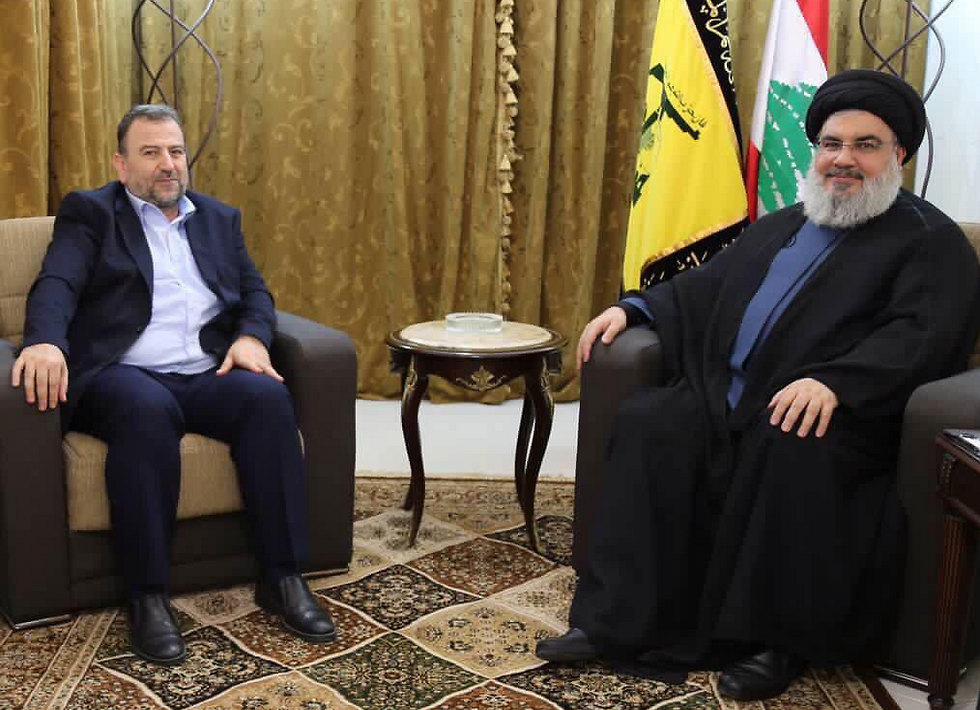 Nasrallah meeting with number 2 man in Hamas
Nasrallah meeting with number 2 man in Hamas
The confrontation will come. And even assuming that Israel will be hit and suffer, and it will be hit, Lebanon will return to the Middle Ages. And despite the obvious outcome, Hezbollah continues.
It is not clear why anyone thinks that Hamas is any different from Hezbollah. That does not mean that Hamas should not be offered a generous deal on the basis of “rehabilitation in return for demilitarization.” But all we have to do is look at Hezbollah, in order to know that Hamas’ response is obvious.
Narcosralla
Hezbollah is not only an international terrorist organization, it is also an international criminal organization. Much of the organization’s income comes from cocaine trade. President Obama, upon his election, adopted a conciliatory policy and declared intention to engage in dialogue and integrate Hezbollah into Lebanese politics.

In 2008, five years before he was appointed head of the CIA, John Brennan wrote a position paper that outlines the new appeasement policy toward Iran and Hezbollah. “The president must implement a policy of integration that encourages the moderates,” he wrote.
It is possible that appeasement can work. But as far as Iran and Hezbollah are concerned, their appetite is only growing. Instead of restraint, Iran stuck its long arms throughout the Middle East, to Yemen, Syria, and total control over Lebanon through Hezbollah.
And furthermore, the US Drug Enforcement Agency (DEA) exposed the huge drug trafficking and money laundering network of Hezbollah as part of Operation Cassandra. Hezbollah, in conjunction with Latin American drug cartels, committed crimes on American soil. But the US administration decided that appeasement is more important than combating crime and terrorism, and instructed its agencies to turn a blind eye so as not to irritate the monster and not distract from signing the nuclear agreement with Iran.
John Kelly, the man who headed the Cassandra operation, claims that “Hezbollah is one of the largest transnational crime organizations in the world.” But gradually it became clear to him and the FBI agents dealing with issues related to Iran that their work was for nought. The matter was revealed last year in a detailed, worldwide report by Politico magazine, which apparently gave immunity to the monster. The Obama doctrine apparently gave immunity to the monster.
Tags: Hezbollah, Israel, Lebanon, United Nations


